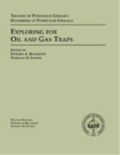Difference between revisions of "Surface geochemical exploration for petroleum"
Jump to navigation
Jump to search
(Initial import) |
Cwhitehurst (talk | contribs) m (added Category:Treatise Handbook 3 using HotCat) |
||
| (4 intermediate revisions by 3 users not shown) | |||
| Line 6: | Line 6: | ||
| part = Predicting the occurrence of oil and gas traps | | part = Predicting the occurrence of oil and gas traps | ||
| chapter = Surface geochemical exploration for petroleum | | chapter = Surface geochemical exploration for petroleum | ||
| − | | frompg = 18- | + | | frompg = 18-3 |
| − | | topg = 18- | + | | topg = 18-3 |
| author = Dietmar Schumacher | | author = Dietmar Schumacher | ||
| link = http://archives.datapages.com/data/specpubs/beaumont/ch18/ch18.htm | | link = http://archives.datapages.com/data/specpubs/beaumont/ch18/ch18.htm | ||
| Line 14: | Line 14: | ||
| isbn = 0-89181-602-X | | isbn = 0-89181-602-X | ||
}} | }} | ||
| − | Surface indications of oil and gas seepage have been noted for thousands of years, and such seeps have led to the discovery of many important petroleum producing areas. Over the past sixty years, numerous geochemical and nonseismic geophysical surface exploration methods have been developed. The application of these geochemical prospecting methods to oil and gas exploration has resulted in varied success and occasional controversy. Few question the fact that hydrocarbons migrate to the surface in detectable amounts, but many remain uncertain of how such information can best be integrated into conventional exploration and development programs. This chapter examines surface geochemical prospecting technology and discusses its application. | + | Surface indications of oil and gas seepage have been noted for thousands of years, and such seeps have led to the discovery of many important [[petroleum]] producing areas. Over the past sixty years, numerous geochemical and nonseismic geophysical surface exploration methods have been developed. The application of these geochemical prospecting methods to oil and gas exploration has resulted in varied success and occasional controversy. Few question the fact that hydrocarbons migrate to the surface in detectable amounts, but many remain uncertain of how such information can best be integrated into conventional exploration and development programs. This chapter examines surface geochemical prospecting technology and discusses its application. |
==See also== | ==See also== | ||
* [[Principles of surface geochemical exploration]] | * [[Principles of surface geochemical exploration]] | ||
| − | * [[ | + | * [[Surficial geochemical case histories]] |
| − | |||
==External links== | ==External links== | ||
| Line 28: | Line 27: | ||
[[Category:Predicting the occurrence of oil and gas traps]] | [[Category:Predicting the occurrence of oil and gas traps]] | ||
[[Category:Surface geochemical exploration for petroleum]] | [[Category:Surface geochemical exploration for petroleum]] | ||
| + | [[Category:Treatise Handbook 3]] | ||
Latest revision as of 19:23, 24 January 2022
| Exploring for Oil and Gas Traps | |

| |
| Series | Treatise in Petroleum Geology |
|---|---|
| Part | Predicting the occurrence of oil and gas traps |
| Chapter | Surface geochemical exploration for petroleum |
| Author | Dietmar Schumacher |
| Link | Web page |
| Store | AAPG Store |
Surface indications of oil and gas seepage have been noted for thousands of years, and such seeps have led to the discovery of many important petroleum producing areas. Over the past sixty years, numerous geochemical and nonseismic geophysical surface exploration methods have been developed. The application of these geochemical prospecting methods to oil and gas exploration has resulted in varied success and occasional controversy. Few question the fact that hydrocarbons migrate to the surface in detectable amounts, but many remain uncertain of how such information can best be integrated into conventional exploration and development programs. This chapter examines surface geochemical prospecting technology and discusses its application.